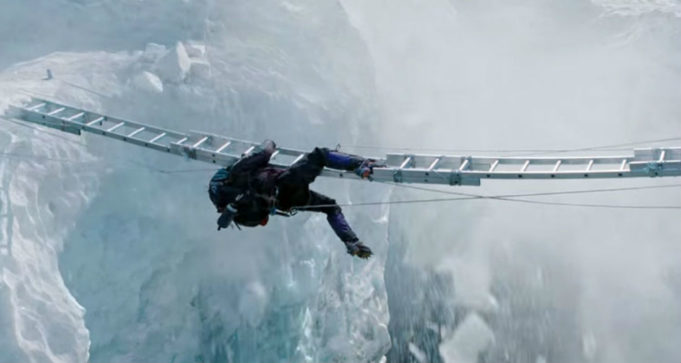My Film page this week was a casualty of the early deadlines facing our Best of Fort Worth issue. Usually at least one really good movie comes out during that week, and I like to bring my A game for that in an issue that lots of people are going to read. This year, that’s not so much the case, so I don’t mind. Anyway, let’s get you caught up.
How hard can it be to make a movie about chess? Granted, the game isn’t as fast as, say, basketball. Even so, as a (rankest of rank amateur) player myself, I’m puzzled as to what’s so difficult about putting it on film. It’s about letting the audience know where things are in relation to one another, what their potential is, and where they might move to. Yet I’ve seen the game defeat one filmmaker after another. Edward Zwick is the latest to fall in Pawn Sacrifice, despite having a terrific real-life chess story to film. The movie expands from Dallas to local theaters this week.
The movie tells the story of Bobby Fischer, who even as a Brooklyn teenager (Seamus Davey-Fitzpatrick) in the 1950s is showing signs of his unlimited potential as a chess genius and a crazy person. Hearing his mother (Robin Weigert) carrying on with her latest boyfriend while he’s trying to study moves, he throws her out of the house. “Go back to Moscow with your commie friends! I need silence!” As a young man (Tobey Maguire), Bobby takes the chess world by storm, launching electrifying attacks against the cautious Soviets who dominate the game as part of a one-man offensive to take the championship from them and the reigning title-holder, Boris Spassky (Liev Schreiber). It culminates in the World Chess Championship in 1972, when Bobby faces the Russian in Reykjavik. The world thinks that Bobby’s eccentric behavior is just an attempt to mess with the Soviets’ heads, when it’s his own head that’s far more messed up.
In real life, Fischer’s paranoid delusions didn’t fully manifest themselves until after the 1972 matches. In the movie, Bobby oscillates between trash-talking chess jock demanding better prize money and lodging and a recluse cowering in the corner of his room, ranting about Communists and Jews mounting a world conspiracy. No wonder Maguire’s performance seems disjointed; the genius and the madness don’t seem to be emanating from the same person. The movie unfortunately succumbs to the whole romantic fantasy that playing chess leads to insanity. It’s true that chess champions have gone crazy in the past, but others have been well-adjusted people. One of Fischer’s handlers, Fr. Bill Lombardy (Peter Sarsgaard) even repeats the discredited story that 19th-century master Paul Morphy committed suicide surrounded by women’s shoes. (Morphy died of a stroke in his bathtub, with only his own shoes nearby.)
Similarly, Bobby’s handlers go back and forth between heartlessly manipulating him and pleading with him to get help, and there’s no logic to it. When Spassky interrupts one match to claim that his chair is vibrating, we don’t know whether he’s throwing his opponent’s diva antics back at him or falling victim to Bobby’s mind games. (Schreiber nevertheless gets the movie’s best bit, when he refuses to win by forfeit and tells the KGB agents spying on him to accede to all of Fischer’s demands.) Worst of all, Zwick gives us such fleeting glimpses of the boards during Bobby’s games that we can’t appreciate his chess prowess for ourselves. He and screenwriter Steven Knight (stop giggling!) throw around the names of chess openings like Nimzowitsch, Sicilian, and Grünfeld without dumbing them down, but those are no substitute. They leave us with secondary characters exclaiming about the beauty of Bobby’s artistry and hoping that we take it for granted. That’s not good enough. Neither is the rest of this shallow, self-important biopic.
Another movie based on real events is Everest, which is based on the 1996 climbing disaster on the world’s highest peak that left six climbers dead. (Of course, Outside magazine reporter Jon Krakauer was on that climb and subsequently wrote Into Thin Air, a best-selling account of what went wrong.) The movie moves from IMAX theaters onto regular screens this weekend. Unfortunately, there’s no point in seeing it on a regular screen, and not much point in seeing it on IMAX, either.
The movie begins with New Zealander Rob Hall (Jason Clarke), whose company Adventure Consultants caters to fit people who can pay, helping them reach the top of Everest. In the spring of 1996, he’s trying to get another group — including Texan Beck Weathers (Josh Brolin) and Krakauer himself (Michael Kelly) — onto the summit during the short window where the weather makes it possible. The trouble is, he’s got so much competition from other firms, including one run by American Scott Fischer (Jake Gyllenhaal), that there’s the serious possibility of a logjam in an inhospitable place.
Icelandic director Baltasar Kormákur made his bones directing low-budget action movies in Europe (The Deep, 101 Reykjavik) and America (2 Guns, Contraband). This is a much bigger canvas, and it’s too much for him. The climbers look too much alike bundled into their heavy parkas, and he gives us no sense of where the climbing parties are in relation to one another, to the summit, or to where help might be. The character of Fischer is so poorly developed that he comes off like a stoner who’s in over his head. The subplots involving Rob’s relationship with his pregnant wife (Keira Knightley) and Beck’s strained marriage back in Dallas are just straight soap opera. All this might have been compensated for by generating a sense of the unique dangers around Everest, but Kormákur fails to raise the pulse. I’ll credit the second unit for getting some spectacular shots of the Nepalese scenery and the lower portions of Everest. Still, this isn’t nearly enough to justify the ticket price, let alone the IMAX upcharge. For a movie about the world’s biggest mountain, Everest feels small.
The vocabulary word for today is “chaebol.” That’s the word for one of the family-owned conglomerates that dominate South Korea’s business landscape, manufacturing and selling everything from cars to insurance policies to movies to snack foods. (Samsung and Hyundai are two particularly famous chaebols.) As is the case with rich folks everywhere, some of the people destined to inherit chaebols turn out to be spoiled little brats, but because of the economic and political power of chaebols, South Korean scions of wealth can behave in particularly monstrous ways. That’s the key to understanding Veteran, the latest Korean import that hits AMC Grapevine Mills (courtesy of CJ Entertainment, a division of Samsung).
Hwang Jung-min plays a seasoned Seoul police detective named Seo Do-cheol who receives a break in a big case from a friendly truck driver named Bae (Jeong Woong-in). Seo is later stunned when Bae later turns up comatose in a hospital, the result of trying to get his back wages from chaebol princeling Jo Tae-oh (Yoo Ah-in), who made him fight for the money and proceeded to have Bae beaten senseless in front of his young son. An outraged Seo vows to bring down Jo despite the latter’s attempts to neutralize him, either with carrots or sticks.
Director Ryoo Seung-wan doesn’t have the Stateside name recognition of some of his compatriots, but the guy knows his way around an action movie — his international spy thriller The Berlin File is further proof. He has a sure hand when it comes to balancing the action sequences with the comedy (with his newfound love of smash cuts, he seems to have been watching Edgar Wright’s movies recently). He’s helped by Hwang, who always looks like he’s just been rudely awakened from a nice nap, but he’s as assured being henpecked by his wife as he is sliding over the hood of a car. He’s countered well by Yoo, who makes an eminently hissable villain — Jo viciously beats his own attack dog when he gets upset, and he’s no more lenient on those who actually can fight back. When he gets in a sparring session with an MMA fighter, Jo not only wins but also snaps the guy’s ankle, ignoring his repeated requests to tap out. (It’s no mystery where the guy gets his sadistic tendencies after a scene where he nonchalantly watches his dad cane an incompetent employee.) The bare-knuckle climactic showdown between the two in a crowded Gangnam district is a brutally satisfying resolution to this formulaic but well-made thriller.












